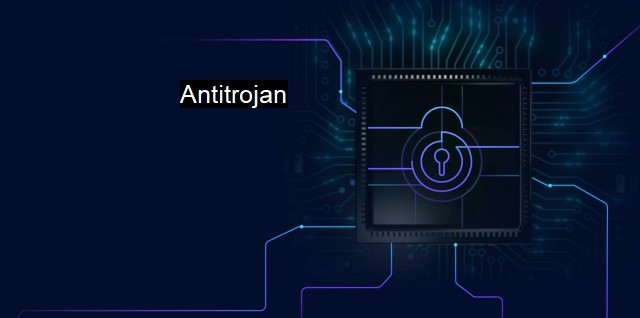What is Antitrojan?
Understanding Antitrojan: The Importance of Cybersecurity in Modern Antivirus Programs
As the world becomes more digitalized, the need for protection from harmful software over the internet becomes increasingly essential. the term "Antitrojan" refers to a specialized software program that is designed to have the ability to detect, quarantine, and remove Trojan horse viruses that might infect a device. This software is crucial given the enormous influence of computers in our lives, from managing our family photos and personal profit-making enterprises, to industrial systems that run lines for energy production and supply.A Trojan horse, much like the ancient myth of the giant wooden horse hiding an army within it, is malicious software designed by cybercriminals to trick users into loading and executing harmful codes on their systems. It sits silently, hiding and blending within genuine software, sneaking past defenses by masquerading as something harmless or even beneficial. Once inside the network, the Trojan gives control to the hackers, who can then steal valuable information, damage files, or plant more malicious software.
These have unique properties which set them aside from ordinary viruses. While the profile of the damage or prolonged theft can range vastly, what defines these types of infections is the camouflage that puts them at the doorstep. the consequence can be dire if not addressed and can lead to loss of sensitive data, reduced system performance, crashed systems, lost productivity, and in worst-case scenarios, compromised personal or business integrity due to leaked information.
That is where Antitrojan software comes into the limelight. They are designed to have the ability to detect and deal with these entities that misrepresent themselves and often arrive concealed in something innocuous. Different brands create these programs, but regardless of the differences, all these antivirus service providers offer automated and manual detection, quarantine of identified threats, and removal of harmful files found during scans.
Typically, the Antitrojan first scrutinizes every nook and crevice of our computers using specialized scanning modes to seek and detect the Trojan viruses. Once recognized, the Trojans are isolated to halt any additional harm they can do, 'quarantining' them to be dealt with in the future. once the Trojans are rendered powerless, the antitrojan software removes them thoroughly. This includes scrubbing any trace of code left from the infection because if overlooked, they can cause harm even after the primary threat is neutralized.
Another pivotal feature of antitrojans involves real-time detection and protection. Like most antivirus software, antitrojans guard your system around the clock, guarding against Trojan attacks even when you're not aware, lest a thoughtless click on an ad plunges your system to risk.
That said, it is worth noting that while these Antitrojan protection programs play a vital part in providing comprehensive cybersecurity, they are not exclusively all-encompassing. Often, they function best when combined with other security software, such as a firewall or a standalone antivirus, to form a multi-pronged approach to security.
The battleground of cybersecurity is continuously evolving, with attackers getting increasingly innovative with their tactics. Thus, software developers come up with newer and smarter versions of Antitrojan software to outsmart them, keeping users safe. These strides in progress bring us to a safer cyber space, where the average user can navigate more confidently.
Antitrojan programs grant us the power to protect ourselves against unseen threats in the digital sphere. They take care of eradicating Trojan viruses, one of the most damaging and cunningly designed malicious software types out in cyberspace. Equipped with the right Antitrojan program, one can easily deal with trojan attacks, offering safe passageways through what can often seem a treacherous internet landscape.

Antitrojan FAQs
What is an antitrojan?
An antitrojan is a type of software designed to detect and remove trojans or trojan horses from a computer system.How does an antitrojan work?
Antitrojans work by scanning a computer system for known trojan signatures, behavior patterns, and other indicators of malicious activity. Once detected, the antitrojan initiates a process to neutralize or remove the trojan from the system.Do I need an antitrojan if I already have an antivirus?
Yes, an antitrojan is highly recommended even if you already have an antivirus. Antiviruses are designed to detect and remove a wide range of malware, including viruses, worms, and sometimes trojans. However, trojans are specifically designed to evade detection, making them harder to detect and remove. Antitrojans are specifically designed to provide an extra layer of protection against these types of threats.What are some common features of an antitrojan software?
Common features of antitrojan software include real-time scanning for trojan detection, automatic updates of virus and threat databases, removal or neutralization of trojans, and quarantine of infected files. Some antitrojan software also offers specific protection against ransomware, spyware, and other types of malware.Related Topics
Malware removal Virus detection Spyware protection Endpoint security Computer forensics
| | A | | | B | | | C | | | D | | | E | | | F | | | G | | | H | | | I | | | J | | | K | | | L | | | M | |
| | N | | | O | | | P | | | Q | | | R | | | S | | | T | | | U | | | V | | | W | | | X | | | Y | | | Z | |
| | 1 | | | 2 | | | 3 | | | 4 | | | 7 | | | 8 | | |||||||